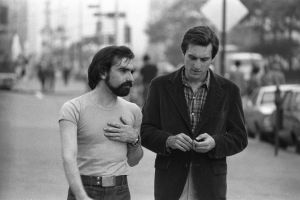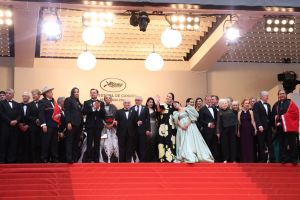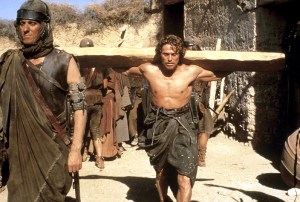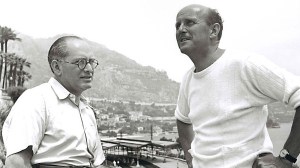EXCLUSIVE: Martin Scorsese is returning to the Berlin Film Festival tomorrow for the first time in a decade. The cinema legend, currently on the awards circuit with latest epic Killers Of The Flower Moon, will be feted with the Berlinale‘s highest honor, its lifetime achievement Golden Bear.
Ahead of the ceremony tomorrow, the indefatigable Scorsese (81) found time to speak to us. In answer to ‘Deadline’s Five Burning Questions’, the filmmaker discussed a new project he has playing at the festival, some of the career collaborations he is most proud of, the importance of film festivals, his expectations for the future of cinema, and what might be next for him.
Scorsese has been to the Berlinale a number of times before, including with Raging Bull, Gangs of New York and Shutter Island, all of which screened out of competition, and with Berlinale competition entry Cape Fear in 1992. His Rolling Stones concert film Shine a Light was the opening night film of the 2008 edition, while his HBO documentary about the New York Review of Books, The 50 Year Argument, was first presented as a work in progress in 2014.
This year, he is at the festival with Berlinale Special entry Made In England: The Films Of Powell And Pressburger, a documentary he has narrated about British film duo Michael Powell and Emeric Pressburger, known for their 1940s classics such as A Matter Of Life And Death, Black Narcissus and The Red Shoes. You can see a first clip of the film here. We hear good things.
Scorsese comes to the 74th Berlinale at a time when the event is in flux, facing programming, funding and broader political challenges. It marks the final edition for outgoing directors Carlo Chatrian and Mariette Rissenbeek.
In recent years, Scorsese himself has spoken powerfully about the challenges facing cinema, about his own mortality, and yes, his thoughts about Marvel movies. Some of these topics we explored in greater detail at Cannes, when we did a deep-dive with the filmmaker about Killers Of The Flower Moon.
For those who care about cinema, any opportunity to hear from Scorsese is a boon. Below is our latest chat with the great filmmaker.
DEADLINE: You have narrated Berlin festival entry Made In England: The Films Of Powell And Pressburger. What do those filmmakers mean to you, and how does their work resonate today?
MARTIN SCORSESE: Powell and Pressburger’s films mean the world to me. I saw The Red Shoes when it first came out, and it left a deep and lasting impression on me. Other pictures I saw out of order and in a truncated or extremely compromised form, but I could still feel the power of the stories. I made contact with Michael in the late 70s—he and his films were almost forgotten at that point.
When I finally managed to locate prints and see the pictures, one by one, often with Michael, it was like the pieces of a puzzle magically coming together. I’ve gone back to the ones I love many times over the years, and as I’ve gotten older they’ve grown and changed with me. They’re like companions.
I don’t really know how their pictures resonate with others today. I know that many young people in my world love The Red Shoes and Colonel Blimp and I Know Where I’m Going and A Matter of Life and Death. And I know that they resonate for me. Maybe more deeply than ever.
‘Made In England: The Films Of Powell And Pressburger’ (credit: Berlinale)
DEADLINE: Killers Of The Flower Moon is the latest chapter in the magical cinematic journey you’ve been on as a director. When you look over your career, what are you most proud of and are there experiences, lessons or collaborations that stand out to you?
SCORSESE: That’s a difficult question to answer—I’m still on the journey and I’m not looking back on my career. Obviously my collaborations with Bob De Niro and Leo DiCaprio have been extremely precious to me. So has my collaboration with Thelma Schoonmaker since 1980. I could name other people. To have those kinds of relationships, based in trust and love … it’s meant everything. As for the lessons, I think I’m still learning them.

Martin Scorsese and Robert De Niro working on ‘Taxi Driver’ (credit: Getty)
DEADLINE: How important are film festivals today?
SCORSESE: They’re essential, because they offer audiences a way of looking at movies that has nothing to do with box office or mass popularity and everything to do with the cinema as an art form. I find that too many of them have been put in a difficult position, where they have to justify their existences in one way or another. Maybe it’s always been like that. But they are essential.

The cast and producers of Killers Of The Flower Moon at the Cannes Film Festival (credit: Getty)
DEADLINE: Robert Altman said that “Filmmaking is a chance to live many lives”. What cinematic journeys and adventures are you still keen to live out?
SCORSESE: I have so many projects… there’s a new film about Jesus that I’ve been writing and thinking about, and other ideas that I’m still exploring.

Scorsese previously directed Willem Dafoe in The Last Temptation Of Christ (credit: Universal/courtesy Everett Collection)
DEADLINE: This may be the strongest awards season in years — I’m sure you’re glad to see international cinema playing an important role in that. Some of the films have helped reinvigorate the box office, meanwhile ‘peak TV’ is said to be over, despite the inevitability of streaming. Are you hopeful or fearful for the future of filmmaking as a craft, and of cinema as a medium?
SCORSESE: I’m not fearful for the future of filmmaking. The tools of filmmaking have become much more affordable for young people. The important thing is to differentiate filmmaking that is grounded in a love for cinema with “making a movie” as a statement or trying your hand as a director as a career choice. At the moment, there’s a very heavy emphasis on the business, the box office, the technology, the “impact,” and so on. But that doesn’t really have anything to do with the actual creation of cinema. I suppose that it will be a little lonelier than it was, quite a bit tougher for a while. But the cinema will survive. It’s not something that can be destroyed.

Leonardo DiCaprio and Lily Gladstone in Killers Of The Flower Moon (credit: Paramount)
Melinda Sue Gordon / © Apple TV+ / Courtesy Everett Collection

